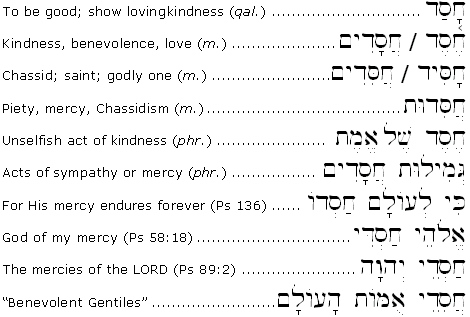|
|
|||||||||||||||||||||
 |
|||||||||||||||||||||
|
Learn Hebrew |
|||||||||||||||||||||
|
Hebrew Word of the Week |
|||||||||||||||||||
 |
|||||||||||||||||||
|
In the words below, see how the key letters (Chet, Samekh, and Dalet) are used to form other Hebrew words: |
|||||||||||||||||||
 |
|||||||||||||||||||
|
This root basically has the idea of lovingkindess, love, faithful love, and (in the case of the Lord), covenantal faithfulness based on love. Chasadim (plural) refers to the many acts of loyalty God performs toward the human race (Ps.106:7,45; Lam.3:22,32). Chesed is the fourth of the Sefriot defined in the Kabbala, depicting God's love for His creation. |
|||||||||||||||||||
|
Pictographic Meaning |
|||||||||||||||||||
 |
|||||||||||||||||||
|
Loosely construed, the pictogram may suggest a leader who passes beyond the fence (of selfishness) and enters through the doorway of compassion. |
|||||||||||||||||||
|
Hebrew for Christians |
|||||||||||||||||||
|
|||||||||||||||||||